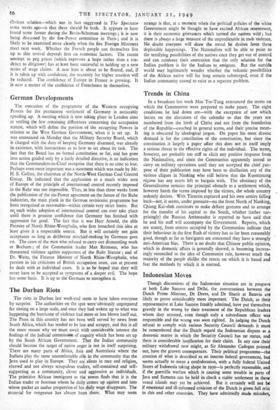German Developments
The execution of the programme of the Western occupying Powers for the permanent settlement of Germany is noticeably speeding up. A meeting which is now taking place in London aims at settling the few remaining differences concerning the occupation statute, which will define the position of the occupying Powers in relation to the West German Government, when it is set up. It was announced on Monday that the Military Security Board, which is charged with the duty of keeping Germany disarmed, was already in existence, with instructions as to how to set about its task. The fact that the Board has no formal constitution so far, and has gone into action guided only by a fairly detailed directive, is an indication that the Commanders-in-Chief recognise that there is no time to lose. Perhaps even more important was a statement which was made by Mr. H. E. Collins, the chairman of the North-West German Coal Control Group. He indicated that the application to a much wider area of Europe of the principle of international control recently imposed in the Ruhr was not impossible. Thus, in less than three weeks from the publication of the six-Power agreement on the future of the Ruhr industries, the main plank in the German revisionist programme has been recognised as reasonable—within certain very strict limits. But no such wider adoption of international control can ever take place until there is genuine confidence that Germany has finished with aggression for good. The fact that it was Herr Arnold, the able Premier of North Rhine-Westphalia, who first broached this idea at least gives it a respectable source. But it will certainly not gain acceptance so long as deliberate mischief-making by Germans goes on. The cases of the men who refused to carry out dismantling work at Bochum ; of the Communist leader Max Reimann, who has threatened violence against supporters of the Ruhr Statute ; and of Dr. Weitz, the Finance Minister of North Rhine-Westphalia, who persists in his criticisms of British occupation costs, can at present be dealt with as individual cases. It is to be hoped that they will never have to be accepted as symptoms of a deeper evil. The hope has some basis. It is up to the Germans to strengthen it.






































 Previous page
Previous page